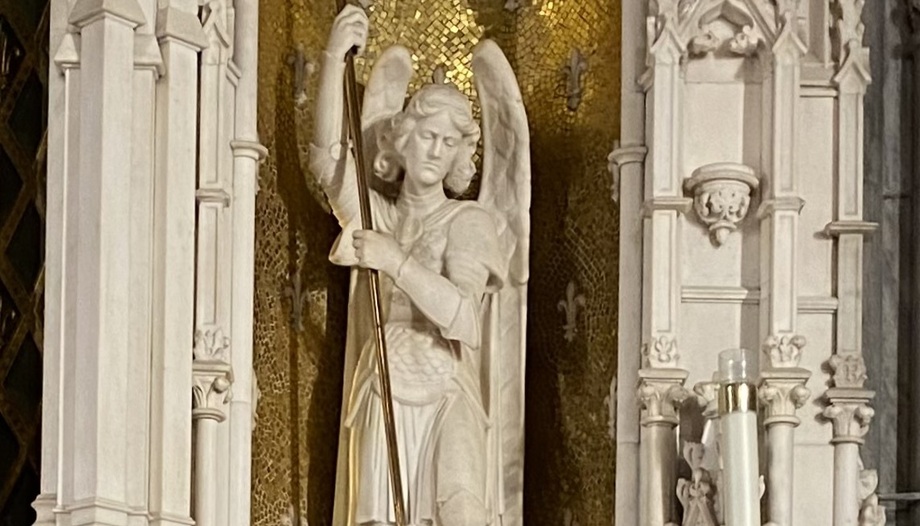It is hard to imagine life without our archangels, Michael, Gabriel and Raphael. They all embody the immense gifts of our Lord: Michael, our fearless protector; Gabriel, the great herald of the Good News; and Raphael, our healer, but there is only one leader of the angelic army, and that is St. Michael.
The word angel means messenger; it derives from the Greek word "aggelos". But the name Michael means "Who is like God." "Angels are everywhere, and everyone loves them," remarked a priest last week after celebrating their feast. But do we harness their immense power and embrace their light?
San Agustin said this of these gifts: "Thus the angels, enlightened by that light by which they were created, became themselves light...by participation in the immutable light and day, which is the Word of God, by which they themselves and all other things were made."
John Damascene said that "angels are secondary lights". There are many things for many people, and Catholics celebrate these treasures.
"The psalmist spoke of angels as "winds and flames," recalls Joel J. Miller in his book "Lifted by Angels: The Presence and Power of Our Heavenly Guides and Guardians." Miller goes on to call them "the spirits" and writes: "'They are the honorable bodiless powers of Heaven'" (...) "in the language of the Church." But they have their limitations and are not omnipresent like God.
Friday, September 29 was the feast of the archangels Michael, Gabriel and Raphael. All are powerful and beloved, but St. Michael is the most popular and invoked daily by many Catholics. Catholics rely on him and depend on this spiritual giant to "defend us in battle" and "protect us against evil and the wiles of the devil." The archangel Michael is the patron saint of shopkeepers, soldiers, doctors, sailors, paratroopers, policemen and the sick. His repertoire for defeating the enemy is impressive, and he has earned this prestigious title.
San Miguel
Like Our Lord, St. Michael watches over his flock, was considered the protector of the Israelites and is venerated in the Catholic tradition as the protector of the Church.
Like all angels, he transmits our prayers and petitions to God, including our guardian angel, who is always with us. They are all a sign of God's love for us.
St. Michael, however, is the one we call upon to "defend us in battle". He led the army of angels that cast Satan and his minions into hell. However, his importance is not exclusive to Catholics. He is also highly esteemed among Jews and certainly the most popular of the archangels. The founding fathers of the Church believed that the archangel Michael played a pivotal role during monumental events in the history of the Catholic Church. The Catechism of the Catholic Church (CCC) states the following about St. Michael: "With every believer there is an angel as protector and shepherd".
St. Michael is mentioned in the Book of Daniel and the letter of Jude as "The Prince" or "The Archangel". And St. Basil and St. Thomas Aquinas qualify him as "The Prince of all the angels".
The devil not only fears our Blessed Mother and St. Joseph, but he is well aware that St. Michael is his direct enemy, his worst nightmare, and he works around the clock to protect God's children from the wicked. And when we pronounce his name, he responds, and it is no wonder that he is considered the "Conqueror of the plague".
The plague of Rome
In 590, a severe plague struck Rome. Many people died, as did the pope at the time. His successor, Pope St. Gregory the Great, organized and led a massive procession through the streets of Rome "as an act of penance" and "seeking forgiveness and atonement for sins." It is said that St. Michael appeared during the penitential procession, and the plague ended.
On October 1, 1884, the Pope Leo XIIIwho reigned from 1878 to 1903, was chatting with his brethren after celebrating Mass when he suddenly became "paralyzed" for several minutes. Although there are several versions of the event, it is believed that he had a vision of the twentieth century so alarming that it forced him to compose the prayer of St. Michael and ordered it to be prayed at the end of the Mass. It is still prayed at some masses and privately by his faithful followers.
Archangels today
Padre Pio sent penitents to what is now the oldest shrine of St. Michael in Western Europe, in Gargano, Italy, to free them, where St. Michael appeared to them.
The archangel is so powerful that he is the angel that exorcists call upon when working with someone who is possessed, oppressed and fighting demonic forces. And the relics of the cave stones are used in their rites.
We can count on St. Michael to separate the evildoers from the righteous at the end of time. And Catholics should be well aware of the magnitude of his power. He, like all of them, are gifts from God and are here to heal, guide and protect us. So, ask for the intercession of the archangel Michael, Gabriel, Raphael and your guardian angel, and remember to thank them, for they are always on your side and ready and willing to help you.











